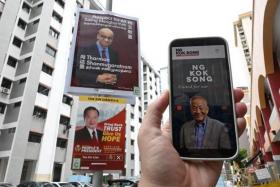George Goh believes he’s the Mao Shan Wang of presidential candidates
Mr George Goh pulls out a wallet from his pocket, its leather weathered and shape bent by age. From it, he retrieves a folded piece of paper, filled with handwritten jottings and numbers, some of which are highlighted.
“This piece of paper has been with me for more than 10 years… I’ve recorded all my journeys from 2009 until 2023,” says the 63-year-old presidential hopeful.
“I like to write down certain things – for example, how I won’t die until I achieve certain things in my life,” adds the serial entrepreneur.
His businesses include Ossia International, a Singapore Exchange-listed retailer of consumer goods; Harvey Norman Ossia, which brought the consumer electronics and furniture brand to Asia; and ITG International, which is currently developing a $1 billion mixed-development project in Jiang Xi province, China.
Among other things, the small envelope-sized piece of paper tells him when some of the companies he runs have hit an average shareholders’ equity of at least $500 million over three years, a qualifying requirement for the presidency.
Mr Goh declines to show The Straits Times what is on the piece of paper or name the companies that meet that criterion.
”I’ve not even submitted (the nomination) form to the Elections Department… we’re going to submit (it) soon. Let’s do it step by step and respect the system,” he says.
However, he adds emphatically: “Aiyah, if I don’t have the $500 million, I would not waste time.”
Meeting that criterion, he says, has been a priority since the last presidential election in 2017, when businessmen Mohamed Salleh Marican and Farid Khan were disqualified because they did not meet the minimum $500 million shareholder equity threshold.
Earnestly, Mr Goh tells you he is not doing it for the fame or fortune. If his bungalow – where he, his wife and four children have lived for the past 10 years – is any indication, he is a very rich man.
Sitting on 2,000 sq m of land in the Holland Road area, it is a verdant sanctuary surrounded by dense foliage and trees old and newly planted.
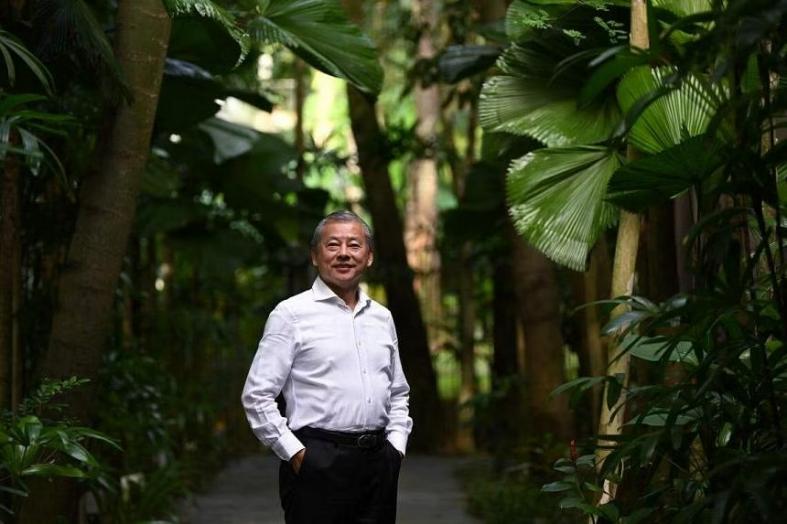
Mr Goh has preserved the original house – built for an English civil servant in the 1930s and boasting a wooden frame, teak flooring and flat roof tiles – and now uses it as a dining and entertainment area.
He commissioned a French architect to build new living spaces and common rooms for his wife and children, aged between 19 and 35. There is even an acoustically impressive music room with a grand piano where Mr Goh – an opera buff and a tenor – sometimes sings.
“Some people may take (the presidency) as a retirement job for six years with a total remuneration of $10 million, which is actually not bad,” he says, referring to the president’s six-year term, with an annual salary of about $1.54 million.
“But cannot, lah. You must have a purpose in life. You must understand where I came from, which is nothing,” he says, adding that he hopes to give back by serving the nation.
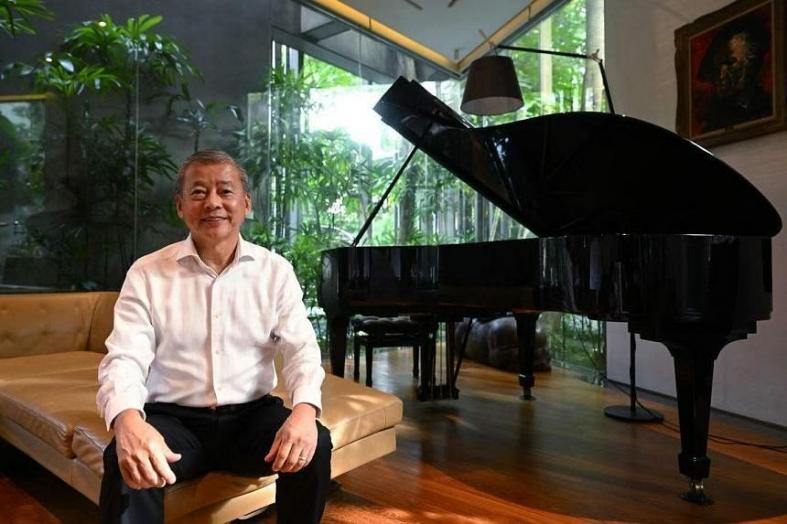
His is a classic rags-to-riches story. He was born in a village in Negeri Sembilan in Malaysia, the seventh of nine children of a lorry driver and a housewife so poor that they had to give away two daughters.
To help make ends meet, Mr Goh – who has a twin brother – worked all sorts of jobs, including tapping rubber and selling sugar cane juice at bus terminals.
At 15, he dropped out of school to come to Singapore, where one of his elder sisters was working as a domestic helper. He started out sweeping floors in a shoe factory, earning no more than $15 a week.
With no money for entertainment, he found solace and comfort singing in the choir of the nearby Chen Li Presbyterian Church in Guillemard Road, under the guidance of the late conductor and composer Goh Say Meng, who encouraged him to study music.
In 1982, at the age of 22, he cobbled together $5,000 from savings and loans and set up a small shoe-making outfit at a terrace house in Bartley Road, working up to 18 hours a day.
He went into trading a couple of years later and formed Ossia Trading, importing shoes from, among other places, Hong Kong, Taiwan and Japan.
Mr Goh reckons he made his first million in the mid-1980s, when he was inundated by orders after organising a trade exhibition for footwear at the now defunct River Valley Hotel.
Just a decade later, he did so well that he could afford to spend $22 million to construct a seven-storey building in Changi.
By then, he had turned Ossia Trading into Ossia International, an investment holding company marketing and distributing lifestyle products including sporting equipment and athleisure wear.
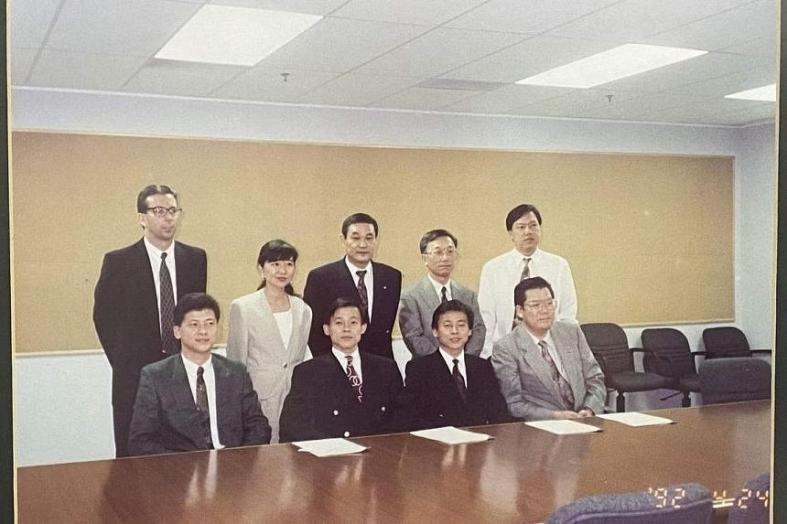
Brands he brought in included British Knights sneakers, Christian Dior shoes and Prince rackets.
The lack of a formal education was no impediment to his grit and ambition. In 1996, Ossia went public.
The next year, Mr Goh became the single biggest shareholder in Rebel Sport, then the largest sporting company in Australia and New Zealand.
“In 1997, I went to Gerry Harvey even though I didn’t know him,” he says, referring to the executive chairman of Australia-based Harvey Norman, the multi-retailer of bedding, furniture and household electronics. “I sold him the idea of how good Asia was.”
The result was the setting up of Harvey Norman Ossia (Asia), which today has 14 stores in Singapore and 28 in Malaysia.
It was not all hunky-dory. When he was 40, his first wife, Ms Tan Nan Ci, whom he married at 24 and who gave him three children, died from pancreatic cancer. He had to juggle business with looking after three children – the youngest was just a few months old and the eldest only 12.
“At one stage, my mother told me to marry our helper,” he recalls with a laugh.
Love struck again when he met his second wife, Ms Lysa Sumali, who is 12 years younger, in church. They tied the knot in 2001 and have a daughter, now aged 19.
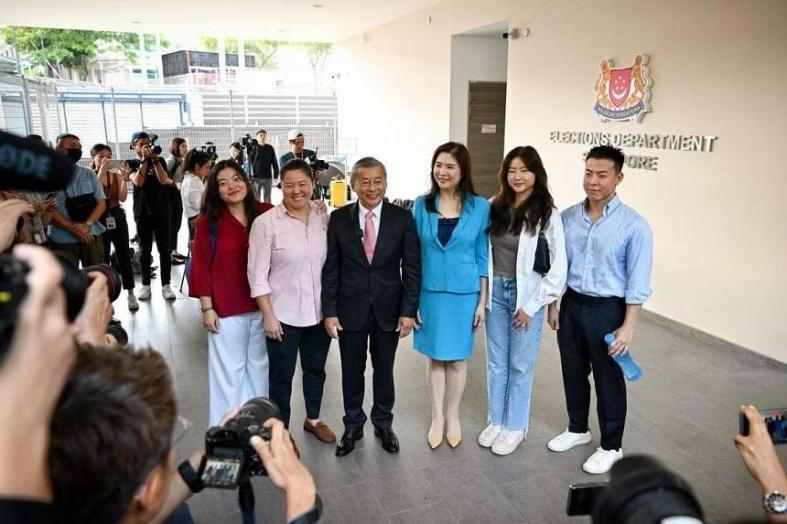
Over the last four decades, Mr Goh has founded more than half a dozen listed companies – from home furnishings and electronics to asset management and water treatment – in countries including the United States, India, China, Britain and Australia.
When asked where he gets his entrepreneurial drive and smarts from, he says: “I read The Business Times and The Straits Times. I also talk to people… When people can see you are nice and want to learn and have potential, they will help you.”
He reckons he has done everything in the business spectrum – “privatisation, listing, sole proprietorship, private limited, limited and unlimited. I know how to demerge or merge, how to exit, how to sell. I can do deals back to back, I can do buying and selling concurrently”.
He adds matter-of-factly: “I’m as good as any Goldman Sachs or Morgan Stanley investment banker.”
His financial savvy and business track record are reasons the entrepreneur – who has always wanted to go to university – spent 12 years pursuing a degree in music from Trinity College London instead of getting an MBA.
“I took the exams seven times until the teacher said: ‘Please don’t take the exams again.’ But I said no,” says Mr Goh, who finally received his degree two months ago.
It appears he has applied the same doggedness to meeting the $500 million shareholder equity criterion for the presidency.
His chief financial officer and a team of accountants and lawyers have been working on this, he says.
“I asked them to look at and study the Constitution, dig up and study the Hansard,” he says, referring to the written record of all parliamentary proceedings.
“I said: ‘Study all the top politicians in the Hansard, what they said about the presidential elections’,” adds Mr Goh, who is especially proud of the fact he is not a hired chief executive but someone who founded and built his enterprises.
The fact that the Government increased the paid-up capital threshold from $100 million to $500 million in shareholders’ equity in 2016, he says, shows that those who qualify are “heavyweights”.
“That means that (the Government) thinks if a guy had $500 million equity, this one is definitely Mao Shan Wang. Or Orr Kim (black gold),” he quips, referring to the two varietals which are among the priciest and most coveted of durians.
He believes his financial experience will stand him in good stead when it comes to safeguarding the reserves, one of the key roles of the president.
“My private sector helped me a lot because we have to look at the full set of our balance sheets, right? We also have to make sure that when there is a crisis, we know how to manage our cash flow and our cash.
“When you’re going to make a withdrawal, you must fully understand how the funds are being moved about. Because I’m from the private sector and not the establishment, I will look at the figures more objectively.”
He leans forward and says earnestly: “Think about it, the executive is from public office. If the president is from the private office, don’t you think it’s perfect when you put them together? You would have both. It’ll be very good because executive policymaking is already done by the public office.
“Why do you need (the president) from the same group of people with the same mindset, everything the same. You need a fresh pair of eyes to look at things differently. So when you grow teeth together, I think it’s very powerful.”
Being contentious and aggressive is not his style, he maintains.
“I don’t think the president should go into the office with a mic to say that I want to bulldoze my way. There’s no way you can run like this. Even in the private sector, we also don’t do it like that. There will never be a win-win.
“In a small little nation like this, if there are two centres of power, how to even survive? Cannot. My way is always to look at things more positively and discuss. But, of course, if at some point I have to disagree, I have to tell them that I disagree. I cannot agree all the time. You think it’s good?”
What if, despite his confidence, he still does not qualify?
“If Mr Goh is disqualified, there will be thousands of very upset people. You trust me on this. There will be a lot of young people with no hope, they will straight away say that this country has no hope. This man has worked so hard his whole entire life, and he has shown us the companies he built, and you say we disqualify him. You think about it. Then they will start to ask, where did the fairness go?”
Since announcing his presidential ambitions, he has attracted his fair share of fans as well as detractors. He has, for instance, been criticised, mocked and lampooned for his poor command of English.
He does not take umbrage nor does not see it as a big issue.
“Language is for communication and there is no necessity that a whole sentence must be perfect as long as you can communicate with the people.”
Mr Goh – who once took pronunciation lessons from voice coach and former radio deejay Rose Tan – reckons he will acquit himself decently if he has to speak at official functions because “when you are on stage… you would be guided by your script”.
As for those who think he lacks the stature and gravitas to be the president and represent the country on a global stage, the former non-resident ambassador to Morocco begs to differ too.
“I was Singapore’s ambassador to Morocco for six years and when I travelled to Morocco, it was important for us to carry ourselves well. I was quite particular about my trousers, suit, shoes and socks, even the tie. Singapore is a small nation and we carry the Singapore flag on these visits. You need to know how to carry yourself well.
“I’ve received many compliments from my counterparts who would say: ‘George, you look very dapper every time.’ I’d say: ‘I’m from a small nation and I have got to make sure that the first impression you have of me is that I’m presentable’.”
It worries him when he hears of people wanting to stand for the presidential election because they were encouraged by their friends, or they do it not of their own volition.
“You must understand that for this job, you need to have a lot of heart for the people… It is not a retirement job, okay?”
Mr Goh – who founded charities to help elderly and disabled Singaporeans, as well poor communities in the Himalayas – believes he has what it takes to become an effective president.
“Singapore has given my family and myself a lot. These 50 years, I could see the development of Singapore. I said to myself: ‘If I want to serve, most likely, this would be my last chance to do so. I’m 63 years old now and by November, I will be 64. If I am elected president, when my term ends in six years, I will be 70 years old’.”
“As a classical singer, the last song that we sing, we must make sure we hit a high C or at least a high B or a B-flat because this is the life of the singer.
“You can see it from Pavarotti to Jose Carreras, it is like that for every singer,” he says, referring to the two famous opera singers. “When they finish on the last note, it’s like they are breathing a sigh of relief and saying: ‘I’m done’.”
Get The New Paper on your phone with the free TNP app. Download from the Apple App Store or Google Play Store now

